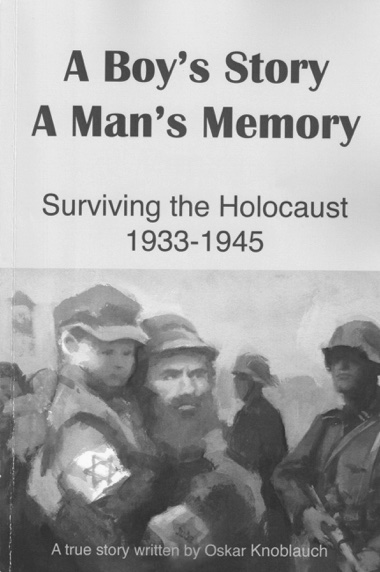It was the spring of 1932, in Leipzig, Germany. Seven-year-old Oskar Knoblauch and his brother, Siegmund, 10, ran enthusiastically to the sports club in their community, where they ran races and played games with their friends. They were always met cordially by Horst Werner, one of the coaches.
As they arrived, Horst was dressed differently than usual, in a light brown uniform with black boots. He stretched out his hand toward the boys and said in a loud, hateful voice, “You Jews are not allowed here anymore! This club is only for pure Germans! Get lost and don’t show your Jew faces here again!”
Siegmund protested, saying he and his brother were native-born Germans whose father served in the German army in World War I. “That does not matter,” Werner interrupted. “You are Jews and are the enemy of our great country! Go home!”
This was how Oskar was introduced to the holocaust that started as the Nazi party prepared to seize power in Germany. Oskar, his sister, brother, and mother survived almost 13 years of forced relocation, slave labor, torture, and the murder of his father.
Why am I telling this story today, about 86 years later, in Sun City Huntley, Illinois? Because I had the privilege of meeting Oskar, now 91, during a recent visit to Phoenix, Arizona, where he lives. My wife, Karen, and I, along with a group of about 60 eighth grade students in the school where our daughter works, were spellbound while he told how he survived the brutal intolerance of Nazi Germany.

Oskar’s book. (Photo provided)
Still vigorous and articulate, Oskar is touring the United States, his adopted country, to “share my experience with our youth in order to preserve our future. One eighth grade teacher at a school where he recently spoke has said, “His message is woven throughout his book, one of beauty in the face of terror, hope in the face of loss, humanity in the face of depravity.”
He began his power point presentation by displaying a message on the screen – “Respect, you have to give it up before you can get it back.” I’m sure that many of the students were hearing about this important event in history for the first time. At the end, Oskar showed another message, this one from Martin Luther King: “We must learn to live together as brothers or perish together as fools.”
Oskar has written a book, “A Boy’s Story, A Man’s Memory.” It transforms the holocaust from an impersonal list of numbers, dates, and statistics, into an ugly but heartwarming, personal account of how the tragedy affected one family. The book is filled with eloquently told anecdotes of Nazi cruelty, most of it aimed at Jews.
In one such incident, he tells how Oskar’s sister, Ilse, came face-to-face with Adolf Hitler in early 1933, shortly after the Nazi dictator took over as chancellor of Germany.
“While Ilse was recuperating in a hospital from a foot operation, Hitler, surrounded by an entourage of other Nazi party members, visited the hospital ward,” Oskar wrote. “As Ilse told us, he went from bed to bed extending his hand as he read each girl’s posted identification information. He would shake hands and smile as he moved from patient to patient. He came toward Ilse with his hand extended. As his eyes read her identification card, he stopped suddenly. His face reddened, his eyes became enlarged, he became furious, and he demanded she be removed at once from the ward and hospital! He screamed at the doctors and staff for allowing a ‘Jew’ to contaminate the ‘purity’ of Germany’s future womanhood. Ilse was instantly wheeled out to the street and left alone in front of the hospital, where she sat waiting for my parents to pick her up. Her foot therapy, scheduled to help her through her post-surgery and recovery period, had been terminated.”
This incident, Oskar said, convinced Oskar’s parents to leave Germany and immigrate to Poland. Oskar’s parents were polish citizens by birth, and Oskar and Siegmund were polish citizens, although they were born in Germany, according to German law. The family had already witnessed much persecution of Jewish citizens and businesses, and had seen Jewish families rounded up and transported to unknown locations against their will.
Combining extraordinary patience with a strong determination to survive, the family spent most of the holocaust years living in a Krakow, Poland Jewish ghetto. They were forced to live in squalid conditions and work at unpleasant jobs. They endured verbal abuse and even beatings by Nazi officials and some Jewish collaborators who turned against their friends and countryman to curry favor with the ruling Nazis. In his talk, Oskar described two occasions of unexpected kindness from unlikely sources in the early 1940s. When Oskar collected garbage and loaded it onto a horse-drawn cart, a young polish boy that drove the cart gave Oskar some food on a number of occasions. In another, Oskar was taken to Gestapo headquarters, where he expected to be punished or deported, only to have a German army official give him a job (no pay) and protect him from serious harm.
In June 1944, his father, Leopold, did not return home from work one day and a few days later they learned that he had been murdered for unknown reasons. He was the only member of Oskar’s immediate family that did not survive the holocaust.
By early 1945, Oskar and his siblings were separated from his mother, Ruzina, cousin Rose, and other extended family members in the Krakow area. On January 17 of that year, Oskar, armed with a pistol and accompanied by his sister and brother, walked out of the building where they lived, as Russian artillery thundered over Krakow. They ran past a column of German soldiers marching rapidly trying to escape the oncoming Russians. The siblings made their way to an apartment, the key to which had been given to Oskar by a friendly Polish official.
The next day, the Russians liberated Krakow and Russian troops let Oskar and a group of Jewish people go free. Oskar wound up in a refugee camp after the war’s end, and he fled Poland when the new Polish government threatened to conscript all young men into the newly organized Polish army.
Oskar tried to immigrate to Palestine, but was prevented by officials of several nations and bad luck. He spent several years in refugee camps in Germany, and eventually got a visa to travel to Canada in 1949. In 1950, he was introduced by a photo to Lila, an American citizen (he doesn’t identify her maiden name in the book), and they met in Niagara Falls, Canada in 1951 after corresponding for awhile.
The couple married there, soon moved to St. Augustine, Florida, and had two children, one of whom was accepted for interior decorating study at Arizona State University in Tempe, Arizona. Paul and Lila moved there in 1970. Lila died in 1987 and Oskar still lives in the Phoenix area, with several grandchildren close by.
A happy ending to a life that began so tragically and dangerously.
Oskar Knoblauch ends his book this way: “I wish to enthusiastically acknowledge all the wonderful teachers and students who have graciously attended and listened to my many lectures in their classrooms, asking questions and discussing many of the things I address in this book. It is my hope and dream to ignite the desire to question injustice, to stand up and speak out for the oppressed, and to plant the seed of tolerance so there may never, ever be more prisoners of hate!”




